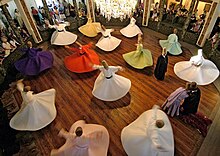Sama (Sufism)
| Mevlevi Sema Ceremony | |
|---|---|

|
|
| Country | Turkey |
| Reference | 100 |
| Region | Europe and North America |
| Inscription history | |
| Inscription | 2008 (3rd session) |
Sama (Turkish: Sema, Persian, Urdu and Arabic: سَمَاع - samā‘un) is a Sufi ceremony performed as dhikr. Sama means "listening", while dhikr means "remembrance". These rituals often includes singing, playing instruments, dancing, recitation of poetry and prayers, wearing symbolic attire, and other rituals. It is a particularly popular form of worship in the sufism.
In 2008, UNESCO confirmed the "Mevlevi Sama Ceremony" of Turkey as one of the Masterpieces of the Oral and Intangible Heritage of Humanity.
This term stems from the root-verb meaning acceptance by tradition, from which derives the words سَمْع (sam‘un) and اِسْتِمَاع (’istimā‘un, listening), often paired with نَقْل (naqlun) and تَقْلِيد (taqlīdun, tradition). It may have been in use since the 10th century to refer to a type of dhikr (remembrance of God), a spiritual concert, a ceremony used by various Sufi orders, particularly the Chishti order of the sub-continent. It often involves prayer, song and dance.
The origination of Sama in the Mevlevi Order of Turkish Sufis credited to Rumi, Sufi master and creator of the Mevlevis. The story of the creation of this unique form of dhikr is that Rumi was walking through the town marketplace one day when he heard the rhythmic hammering of the goldbeaters. It is believed that Rumi heard the dhikr, لا إله إلا الله "la ilaha ilallah" or in English, "There is no god but Allah " in the apprentices beating of the gold and so entranced in happiness he stretched out both of his arms and started spinning in a circle (sufi whirling). With that the practice of Sama and the dervishes of the Mevlevi order were born.
...
Wikipedia
